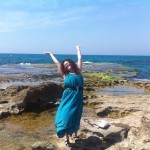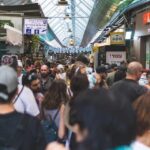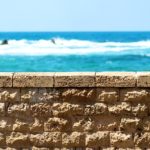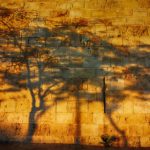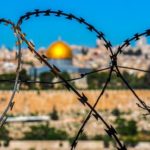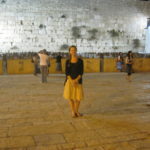Israel: A Volunteer’s Perspective
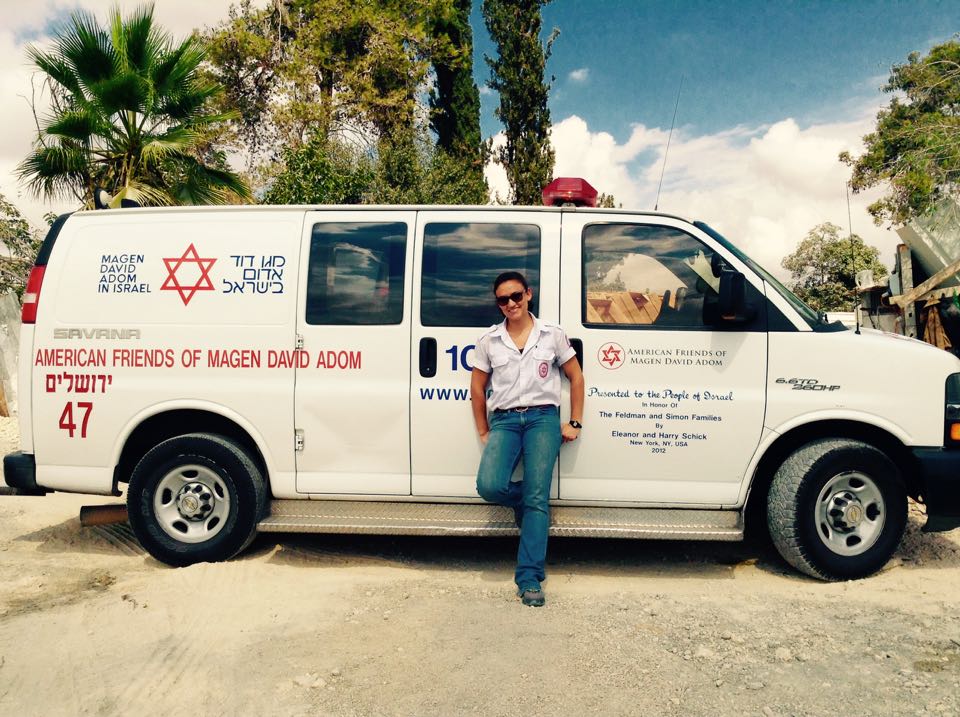
“Ambulance 79, you have a emergency call three miles south of your current location at a construction site. A young man fell from a height of six feet and…”
The wailing of the sirens drowned out the rest of the report as Oshri, the senior medic, flipped them on and began honking at the cars in front of us to move out of the way. My heart was suddenly racing and my stomach tightened nervously as I mentally went through the protocol to follow for cases involving falls.
Falls mean the back could be injured, which means we need the backboard. OK. As soon as we get there, I’ll grab the backboard, the head braces, and the belts. Oh! and the neckbrace! Where is the neckbrace?! Oh, here it is. Phew. Ugh! I can’t get these gloves on!
The noise of the ambulance rattling across the road and the sound of the young man’s plaintive mumbling in Arabic had not allowed me to distinguish the heartbeats through the stethoscope.
I tossed the gloves I had just ripped trying to tug them onto my sweaty hands into the trash can bolted to the side of the ambulance. I managed to finally get the gloves on intact just as we pulled up to the site. We jumped out of the ambulance and divided the medical gear among Oshri, me, and Elior, the ben-sherut, then made our way up a small incline to find our patient.
Now lying on the ground on his side, clutching is stomach in extreme pain, the young worker had lost his footing on the scaffolding, falling six feet before crashing onto a metal post planted in the ground. There was no puncture wound on the abdomen where he made contact with the post, yet the swelling developing around the would indicated extensive trauma and internal bleeding. In a flurry of activity, we had him back-boarded and loaded in the ambulance in less than two minutes.
“I want a very precise blood pressure reading right now!” Oshri commanded from the driver’s seat as he dropped the gear into reverse and turned the ambulance around.
Using my feet to brace myself to keep from toppling off the bench as we sped down the uneven dirt road, I quickly strapped the blood pressure cuff on the patient’s left arm, placed the end of the stethoscope under the cuff, and began pumping up the sleeve to get a reading. Tssssssssss! I let the air out of the sleeve and began pumping it up again. The noise of the ambulance rattling across the road and the sound of the young man’s plaintive mumbling in Arabic had not allowed me to distinguish the heartbeats through the stethoscope. Tsssssssss!
We wanted to become part of Israeli society, to show our support, and to give to the community in a practical way.
My head started to spin and my chest felt tight as I started to panic at my second try’s failure. “What’s the blood pressure?” called out Oshri. Pumping frantically, I shot a furtive glance at Oshri through the rearview mirror. “Just a second.” Cupping the dial in my left hand and using my right hand to press the earpiece deeper into my ear, I took a deep breath and tried to get into the zone—that quiet place in the universe where all EMTs go to be able to hear to take blood pressure readings when the environment is the noisiest.
Oh, God, pleeeaaaase! I pleaded. Thump! Thump! Thump!……. “One hundred over sixty!” Relief flooded over me, first of all, but then concern—that blood pressure was way too low! The whole ride to the hospital as we monitored our patients condition, there was a growing feeling of pride within me: pride at having successfully overcome a difficult challenge, and pride at being part of Magen David Adom, Israel’s national emergency medical service.
In 2014, I studied and volunteered abroad in Israel for a year. It was my first extended stay away from home and my first time in a foreign country. With my sister, I discovered a new world, challenged myself, and made memories to last a lifetime. While planning our trip to Israel, my sister and I were adamant about not being “just another tourist” during our stay. We wanted to become part of Israeli society, to show our support, and to give to the community in a practical way.
Our first step to achieving this goal was to study Hebrew at an ulpan, a Hebrew-language immersion program, on a kibbutz (a collective community). Five months of studying the basics of Hebrew and putting them into practice in the workplace on the kibbutz gave us the tools we needed to be accepted into Magen David Adom’s (MDA) overseas volunteer program. Through this program, we were given training in basic first-aid and then assigned to the Jerusalem MDA station to work as volunteer EMTs on the ambulances.
I worked with volunteers of all different ages and from different stages in life, yet who all felt the responsibility to give back to their community.
On every shift, I would catch glimpses into the structure and variety of Israeli society in Jerusalem. After four months and over one thousand hours of riding ambulances, I had become more familiar with the streets and highways of Jerusalem and the surrounding area and with Israeli culture and its many subcultures than with my own hometown in Mexico and with my own Mexican culture.
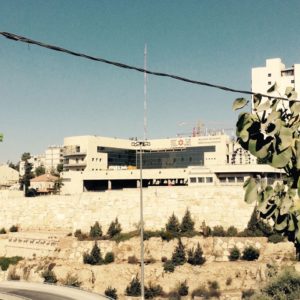
Six-thirty in the morning would find me already at the central station, meeting my team members for the day and taking inventory of the ambulance gear. A very small percentage of MDA personnel are actually employed by MDA; the vast majority are volunteers.
I worked with volunteers of all different ages and from different stages in life, yet who all felt the responsibility to give back to their community: 15 year-olds who did shifts after school, retirees who enjoyed giving their time to work a couple shifts each week, middle-aged mothers who found ways to squeeze in at least one shift a week. In addition to these, there were the bnei-sherut, the 18-20 year olds who, instead of serving in the army, had opted to do their compulsory national service as EMTs in MDA.
Check out Pink Pangea’s Writing, Yoga, and Meditation Retreats.
For two years, they are committed to working shifts five days a week, as if it were a full time job. Also, there are the army trainees. These are young men and women who opt to pursue emergency medicine in the army and are sent to MDA stations in the large cities to complete their practical training under the tutelage of senior paramedics. Overseas volunteers, like me, make up a small portion of the volunteers, coming from all over the world and paying their own way to have the opportunity to participate in the program. Finally, there are the paramedics and senior medics who comprise the employed percentage of MDA personnel. A typical team consisted of a senior medic, a ben-sherut, an overseas volunteer, and a youth volunteer.
I encountered in flesh and blood the personality I had known to exist only books and movies: the orthodox Jew.
Our calls took us to every corner of Jerusalem, right into people’s homes—even into their very bedrooms. As a result, I got a rare glimpse into Israeli’s daily lives. On the narrow streets of Mea Shearim, one of Jerusalem’s ultra-orthodox neighborhoods, I encountered in flesh and blood the personality I had known to exist only books and movies: the orthodox Jew. To walk into their homes and to pick up on the nuances of their lifestyle— the kitchen with two different sinks, one for dairy and one for meat, the dozen pictures of beloved rabbis pinned to the walls, the separate twin beds in the master bedroom—was to understand how intricate their faith is and how strongly it affects even the smallest details of their daily lives.
An emergency at a mosque in Beit Safafa, an Arab village in southeast Jerusalem, was only one of many incursions into the Arab world within Israel which gave me the opportunity to visit places I would not have visited on my own, and dissipated the misgivings I had unconsciously harbored as a result of ignorance. During the four months of volunteering, I came to understand a little more each day about the iconic Israeli soldier, and discovered that they are kids just like me, with dreams, plans, and interests not related at all to the army, who happen to have the obligation to give two years of their lives in service of their country.
Israel: A Volunteer’s Perspective.
I encountered those who did so with a passion that made them willing to put themselves in the very face of danger, and as a result, were now taking physical therapy to recuperate from battle wounds; others, I encountered, who attempted to shirk their duty at any cost, even that of fainting and pretending to feel ill in order to get medical leave. I also discovered a portion of the population that is less heard of outside of Israel: the Philippine or Sri Lankan laborers who are granted visas to come to Israel for the sole purpose of working as caretakers of the elderly.
Once their charge passes away, their visas are revoked and they must return to their countries of origin. The original nationalities and native languages of the patients whose vital signs I took in a single day was so varied that it seemed there was no need to travel the world, for all countries were represented in this melting pot of cultures and peoples.
I also discovered a portion of the population that is less heard of outside of Israel: the Philippine or Sri Lankan laborers who are granted visas to come to Israel for the sole purpose of working as caretakers of the elderly.
Learning Hebrew gave me a pass into the Israeli world; my efforts to communicate in the country’s language caused people to open up to me and include me in their circles more so than if I had just stuck to English and made them speak my language (which most of them do).
Riding the ambulances was a daily “insider’s tour” into real life in Israel, allowing me to see Israelis at their best and worst, in peace and in tension, each one’s individual lifestyle. I was not only there to see, but to help and, I hope, make a small difference. Jerusalem, a tapestry of multi-colored, multi-textured threads, was the perfect setting for this experience of a lifetime.
Want to have this experience for yourself? Check out the following links that I used to find the MDA overseas volunteer program, the kibbutz ulpan program, and the organization that helped me plan my own Israel Experience.

